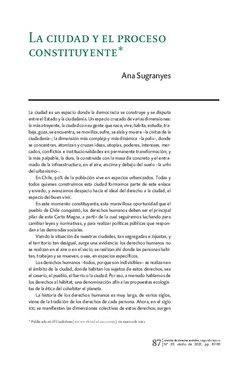La ciudad y el proceso constituyente
The city and the constituent process
Resumen
La ciudad es un espacio donde la democracia se construye y se disputa entre el Estado y la ciudadanía. Un espacio cruzado de varias dimensiones: la más atrayente, la ciudad con su gente que nace, vive, habita, estudia, trabaja, goza, se encuentra, se moviliza, sufre, se aísla y muere –la civitas de la ciudadanía–; la dimensión más compleja y más dinámica –la polis–, donde se concentran, atomizan y cruzan ideas, utopías, poderes, intereses, mercados, conflictos e institucionalidades en permanente transformación; y la más palpable, la dura, la construida con la masa de concreto y el entramado de la infraestructura, en el aire, encima y debajo del suelo –la urbs del urbanismo–.
En Chile, 90% de la población vive en espacios urbanizados. Todas y todos quienes construimos esta ciudad formamos parte de este enlace y enredo, y avanzamos despacio hacia el ideal del derecho a la ciudad, el espacio del buen vivir. The city is a space where democracy is built and contested between the State and its citizens. A space crisscrossed by several dimensions: the most compelling, the city with its people who are born, live, inhabit, study, work, enjoy, meet, move, suffer, isolate, and die—the civitas of citizenship; the most complex and dynamic dimension—the polis—where ideas, utopias, powers, interests, markets, conflicts, and constantly changing institutions are concentrated, atomized, and intersected; and the most palpable, the hard one, built with the mass of concrete and the framework of infrastructure, in the air, above, and below ground—the urbs of urbanism. In Chile, 90% of the population lives in urbanized spaces. All of us who build this city are part of this connection and entanglement, and we are slowly moving toward the ideal of the right to the city, the space of good living.

